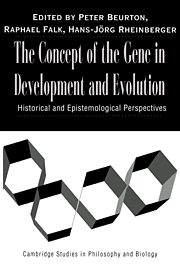The Gene - A Concept in Tension
from FINAL REVIEW
Published online by Cambridge University Press: 12 January 2010
Summary
That was the gene that was.
(rephrasing Stent, 1968)A gene is a gene is a gene.
(Rheinberger, rephrasing Lwoff)The gene has become a household icon of our end-of-the-century culture. There is hardly a news-story or a newspaper issue in which genes are not prominently mentioned: Scientists declare to have isolated a gene for some specific trait; a sexual practice that is claimed to deviate from the norm, or merely an unpopular literary style, is attributed by the press to be “in our genes” (see e.g., Nelkin and Lindee 1995). Geneticists, whether in the field of molecular biology or population dynamics, who should know better, often tumble and implicitly, if not explicitly, nourish and propagate this image of genes as determinants of traits. Although this sentiment is related to the dramatic developments in molecular biology of the last two decades, these notions are not new. Overwhelming as this fad may appear, the confrontation with the essence of our biological nature has always been in the center of interest. The time honored desire of humans to control their fate, and the frustration of the inadequacy of such efforts (in spite of all the progress of science and technology) have engendered the tensions that shaped much of human traditions and religions, as well as science.
- Type
- Chapter
- Information
- The Concept of the Gene in Development and EvolutionHistorical and Epistemological Perspectives, pp. 317 - 348Publisher: Cambridge University PressPrint publication year: 2000
- 42
- Cited by

